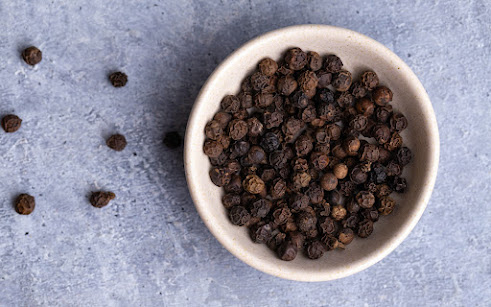 |
| A new method of obtaining piperine from black pepper is more environmentally friendly than the traditional one. Photo Credit: Anas Alhajj |
An international research team of chemists from Russia (UrFU), the Republic of Congo, and India came up with an alternative to the traditional method of obtaining piperine from black pepper. The scientists used a natural solvent for extraction, which has no toxic properties because it consists of a composition from organic salts and acids that are well soluble in water. Moreover, the extract obtained using this technology has better antioxidant activity. The results of the study are published in the journal Sustainable Chemistry.
"Piperine is a bioactive substance that is found in black pepper. It has many useful properties. First of all, it causes that particular pungent taste. Piperine is used in food to increase the absorption of micro and macronutrients in the human body. For example, piperine may be added to yogurt and cheese. There are numerous studies about piperine, but the novelty of our work is the development of a new technology for extracting this substance from black pepper using natural, "green" solvents," - says Full Professor Elena Kovaleva from the UrFU Department of Organic Synthesis Technology.
Traditional solvents such as methanol, ethanol, and ethyl acetate have toxic properties. After the extraction, they require additional purification; otherwise, the extracts cannot be used in the food industry. Currently, natural water-soluble solvents (a mixture in certain proportions of inorganic salts, acids and water) are increasingly being used to extract various biologically active compounds. After extraction, the obtained substances are clean and free from toxic impurities. In order to isolate the greatest amount of piperine from black pepper, scientists conducted experiments to optimize the composition and conditions of the natural solvent. They used different combinations of components, changing the temperature, extraction time, the ratio of the mixture components and water content.
"We used 16 different combinations of components to create the solvent. In addition, all the compounds were non-toxic, exclusively for food use. In optimization experiments, we used mathematical planning using surface response methodology in order to obtain the highest yield of piperine. As a result, the best natural solvent was a mixture of choline chloride, 1.2 propylene glycol, and citric acid in a 1:2:2 molar ratio. The best yield was 39 milligrams of piperine per gram of black pepper," adds Elena Kovaleva.
After the scientists achieved a desired result, they compared the antioxidant properties of the resulting piperine extract against conventional methods of extraction. They discovered a 2-4-fold increase in the antioxidant activity of the piperine extract compared to traditional solvents such as water, methanol and ethanol. This correlates well with an increase in both total phenolic compounds by a factor of 2-23 and total flavonoid content by a factor of 2-80.
In the future, scientists will focus on obtaining functional cheeses with piperine in powdered or encapsulated forms for targeted delivery and for reducing bitterness.
Funding: The chemists conducted the study with the financial support from the Ministry of Science and Higher Education of the Russian Federation under the "Priority 2030" program.
Published in journal: Sustainable Chemistry
Source/Credit: Ural Federal University
Reference Number: chm022223_01







.jpg)